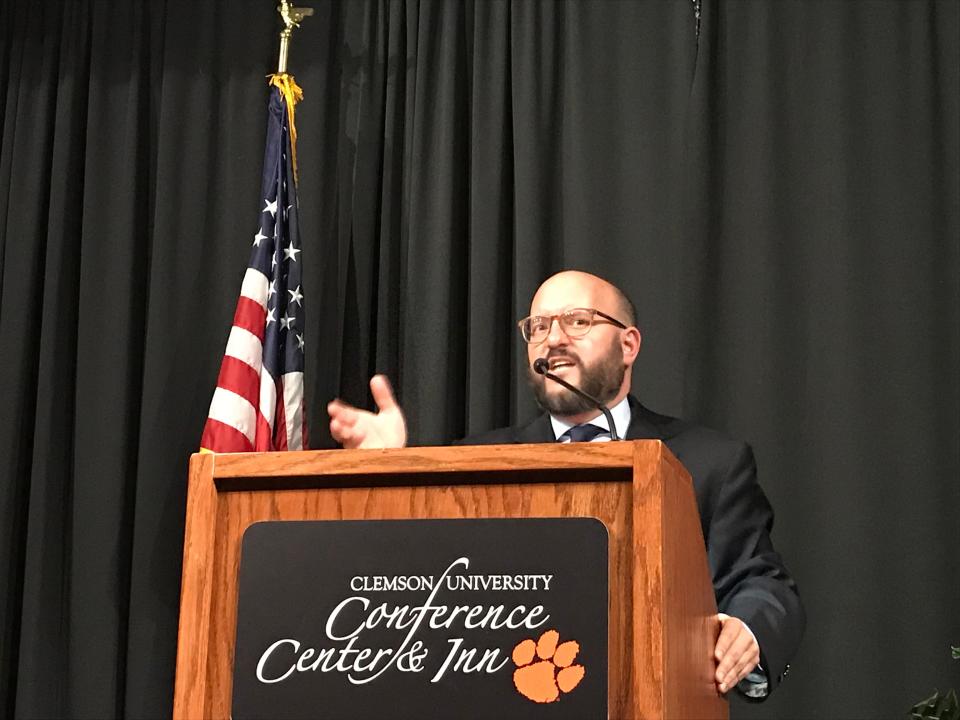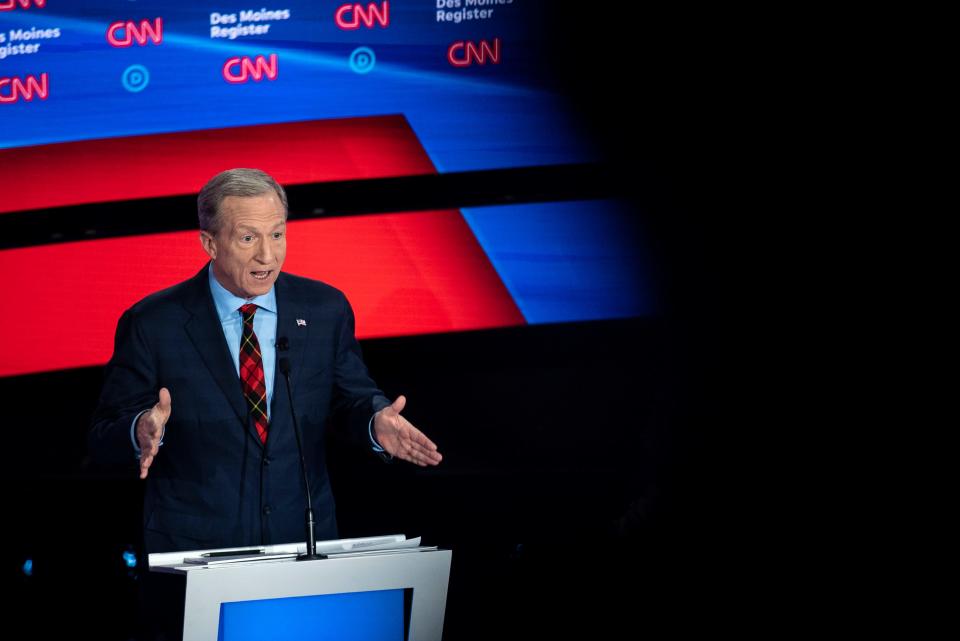Why GOP-friendly South Carolina is still a key state for Democratic presidential hopefuls
GREENVILLE, S.C. – Even though South Carolina is a Republican stronghold, the Palmetto State has a pivotal part to play in the Democratic presidential race.
The reasons have to do with timing and demographics, political experts say.
With Sen. Bernie Sanders coming off a commanding win in Nevada, and former Vice President Joe Biden going all-in on the first-in-the-South contest, here are a few reasons why South Carolina looms large in the Democratic primary.
South Carolina a momentum-builder
A total of 54 delegates to the Democratic National Convention will be up for grabs in South Carolina's primary on Feb. 29, making it the largest prize of the party's first four contests.
More importantly, the top candidates in the primary will gain critical momentum going into Super Tuesday on March 3, which will feature Democratic primaries in 14 states, including delegate-rich California and Texas.
Conversely, hope will fade for those who do poorly in South Carolina.
"If you can't win in South Carolina, then you're going to have a problem winning across the country," said state Democratic Party Chairman Trav Robertson.
After Nevada, Sanders had taken the lead in pledged national delegates, but a commanding win by one of his rivals could vault them ahead.

Black voters are key
In South Carolina, the difference between success and failure will come down to winning support from black voters. Nationally, black voters account for about 25 percent of Democratic voters, but they are expected to cast a majority of the ballots in South Carolina's primary.
South Carolina "doesn't look like Iowa and New Hampshire," said Charles Bierbauer, retired dean of the University of South Carolina's College of Information and Communications. He covered five presidential elections for CNN.
"The black vote, which is critical to the Democratic Party, comes into play for the first time," Bierbauer said.
The primary ballot could be the most crowded in state history. A total of 14 candidates met a Dec. 4 deadline but the field is now down to 8.
Several presidential hopefuls have campaigned in Greenville and other parts of the Upstate during the past several months, fueling interest in this month's primary.
"People are excited. There is a lot of talk about it," said Kate Franch, chairwoman of the Greenville County Democratic Party. "Definitely some voters know who they believe they are voting for, but there is still a good number who are trying to sort it out."

History shows why South Carolina matters
The state's 2008 and 2016 primaries illustrated South Carolina's importance in the Democratic presidential race.
After finishing third in the Iowa caucus on Jan. 3, 2008, Hillary Clinton rebounded and won the New Hampshire primary.
But later that month, Clinton was swamped in South Carolina by Barack Obama. Obama went on to win 13 of the 23 Super Tuesday contests that year on his way to becoming the nation's first African American president.
South Carolina native John Edwards, who finished third in the state's 2008 primary, dropped out of the race four days later.
In 2016, Clinton turned the tables.
After losing in New Hampshire to Sanders, her resounding victory in South Carolina — where she took 73% of the vote —set the stage for Clinton to win seven of 11 Super Tuesday contests. She later became the first woman to claim the party's presidential nomination.
A crucial test for Biden
A victory in the South's first primary would be vital for former Biden, especially if he struggles in Iowa and New Hampshire, said Danielle Vinson, a professor of politics and international affairs at Furman University in Greenville, last month before those races were contested. Biden did in fact stumble, taking third in Iowa and fifth in New Hampshire.
"South Carolina may be a way to solidify him or stop any questions that have arisen about him heading into Super Tuesday," Vinson said.
Paige Hill, communications director for Biden's campaign in South Carolina, said the former vice president has a deep fondness for the state that has developed over decades.
"On a personal level, South Carolina is very important to Biden and his family," Hill said. "He has a very long history here, deep relationships and those relationships go beyond campaigning, they go beyond politics."
Steyer spending big
According to polls, the other top-tier candidates in South Carolina are Sanders, U.S. Sen. Elizabeth Warren and billionaire Tom Steyer.
Steyer's campaign claims he has momentum in the state, citing an early January poll conducted by Fox News that showed him running second to Biden.
Steyer has spent more than $14 million on ads in South Carolina since mid-November, according to data from Advertising Analytics published by NBC News. His investment dwarfs the $2 million paid by the second-highest spending Democratic candidate in the state, Pete Buttigieg, the former mayor of South Bend, Indiana.
Steyer also has the largest campaign staff in the state, according to Abdul Henderson, his deputy campaign manager for battleground states.
"We've put a tremendous emphasis on our direct-voter contacts and introducing Tom to South Carolinians," Henderson said.
"If we can come in in the top three we will call that a victory," Henderson said.
Vinson said Steyer may need a strong showing in South Carolina to remain viable.
"If he doesn't catch fire in Iowa or New Hampshire, it might be a way to keep him going if he did better than expected here," she said.

South Carolina also could turn out to be critical for Sanders and Warren, who each support Medicare for all and other progressive positions.
"If progressives, younger voters coalesce around one, it could be important," she said.
For the rest of the field, a lack of success in South Carolina could foretell that they do "not have much of a path forward," Vinson said.

Will Democratic primary alter South Carolina's political landscape?
President Donald Trump won about 55 percent of the votes in South Carolina in 2016. He is widely expected to again win the state where Republicans control the governor's mansion, the General Assembly, both U.S. Senate seats and five of seven seats in the U.S. House of Representatives.
"All expectations are that in November of 2020 South Carolina is going to go Republican," said Bruce Ransom, a political science professor at Clemson University.
The fact that the state could be a key player in choosing Trump's opponent is "an irony," Ransom said.
While Vinson agreed that the state's presidential vote "is not really in play," Vinson said this month's primary could create energy that might help Democratic candidates in down-ticket races.
"Any time you can get attention focused on Democrats in the state it is good for them," she said. "There are enough people frustrated with Trump, there are new voters, there are the folks who supported Obama in 2012 but kind of sat out 2016. If you can get them back them up and involved as a result of this primary it makes it a little bit easier to get them to the polls in November."
Franch said she hopes the primary will help reverse a dip in the turnout of African American voters in Greenville that has been prevalent for the past decade while also leading to long-term growth for her party in the Upstate.
"This is always about touching voters and helping them see why it is important to be engaged," Franch said.
Follow Kirk Brown on Twitter @KirkBrown_AIM
This article originally appeared on The Greenville News: South Carolina primary: Why it's a key state for Democratic 2020 hopefuls

